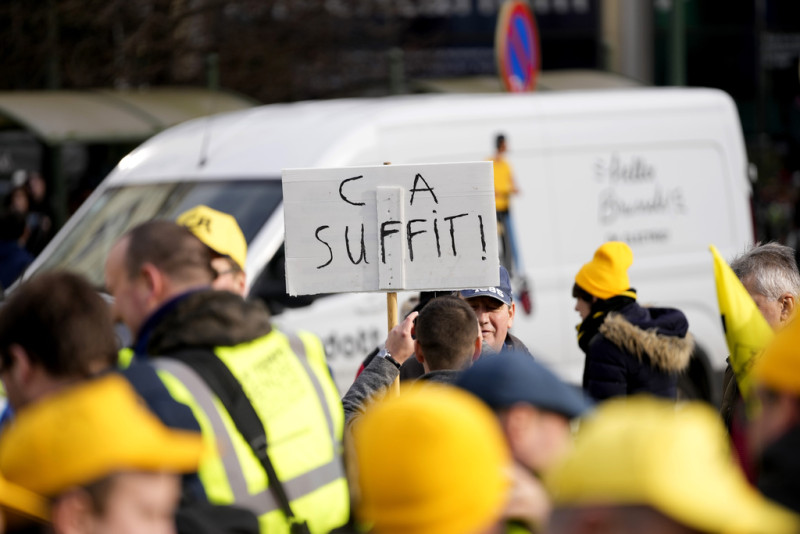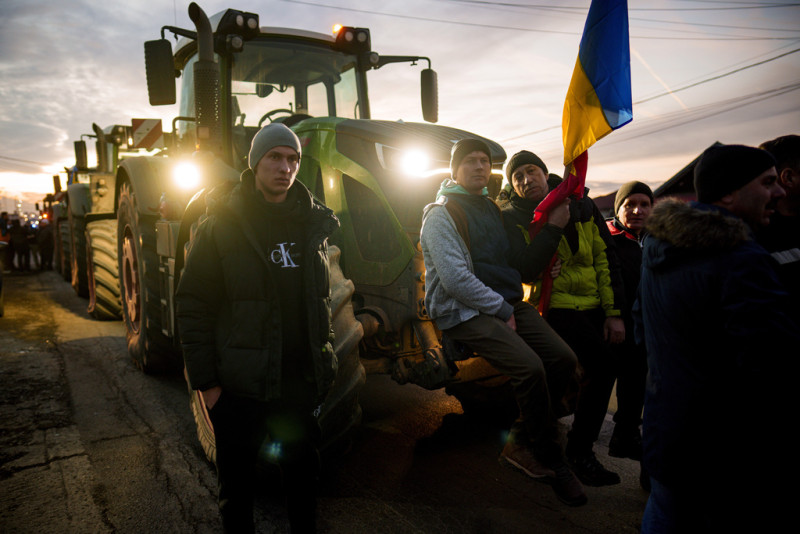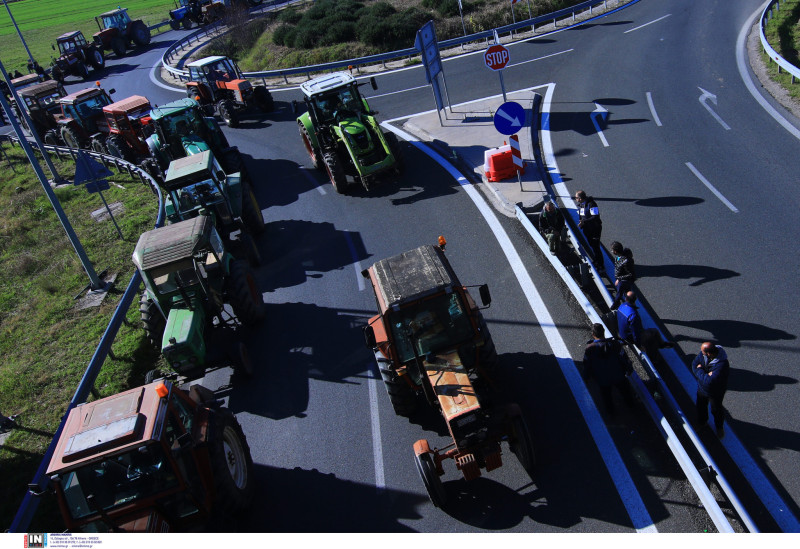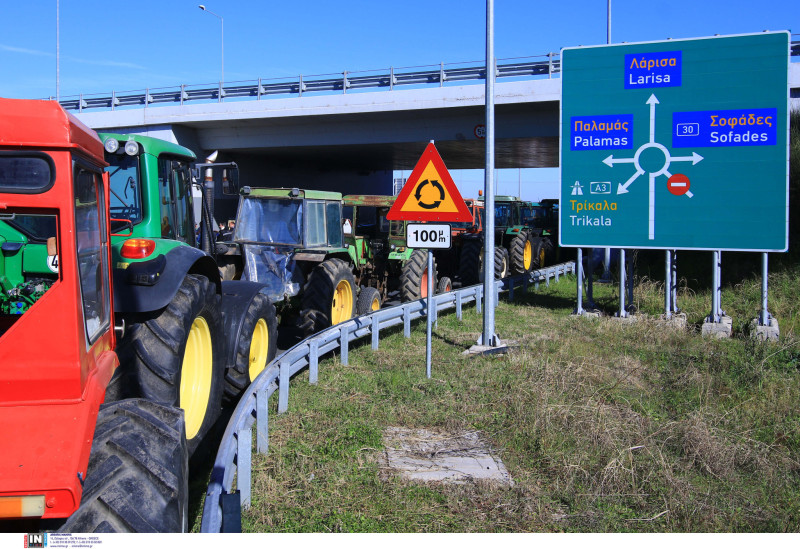With Germany starting the dance of mobilizations, the farmers of Europe are rising up, taking the tractors to the streets and expressing their anger at the decisions of Brussels – Mobilizations in France, Germany, Belgium, Romania and Poland – Determined to continue their mobilizations and the farmers in Greece
From Spain and Italy to Germany, Poland, Belgium and Greece farmers have taken the tractors to the streets of the big cities causing chaos and headache. But also in Greece, farmers’ mobilizations continue in Karditsa, Larissa and Volos, determined to continue their protest. But the question is what has caused this mass peasant anger across Europe?
In recent years, farmers in western Europe have been fighting with growing callousness against policies to protect the planet which, as they say, cost them too much, commented the Guardian website in a report. EU decisions to make farmers pay more for the pollution involved in production, combined with bans on pesticides for the same reasons and restrictions on water use due to climatic conditions, have caused a wave of reactions in the EU.
Yesterday, Wednesday about a hundred French, Dutch and Italian farmers stood in front of the European Parliament to protest the EU’s green policies or free trade agreements. The mobilization of farmers in France continued today. Dozens of farmers also went to Greece yesterday and today warning that they will escalate their protests.
Germany
Germany first sparked protests last December when angry farmers threw manure on the streets of Berlin because the German government scrapped a plan to cut diesel subsidies for farm vehicles. Last week around 10,000 farmers and thousands of tractors flooded the main roads in Berlin towards the Brandenburg Gate in protest against the country’s coalition government over its cuts in fuel subsidies and tax and other charges.
“Farmers today sent a clear message to the federal government to fully withdraw the planned tax increases,” said Joachim Rukwied, president of the German farmers’ union.
For some farmers, the burden of paying for more pollution is a step too far after an energy crisis and pandemic. Indeed, in Germany, the protests have gained vocal support from the far-right Alternative for Germany (AfD) and groups with more extreme and anti-democratic views, according to the Guardian.
France
For the second week, farmers in France, the largest producer of agricultural products in the European Union, took to the streets again. They blocked boulevards and threw boxes of imported goods today, demanding urgent action on low producer prices, green transition regulations and free trade policies, as the growing protests moved closer to Paris.
Crates of tomatoes, cabbages and cauliflowers, which a group of farmers said were imported, were scattered along the A7 motorway, which links Marseille and Lyon, France’s second and third largest cities respectively. On the southwestern edge of Paris, dozens of tractors marched through the morning rush hour. Farmers organized 77 blockades almost everywhere in France, according to a count by the union FNSEA. French intelligence has warned the government that regional farmers’ unions have called on their members to gather in the French capital, causing a headache for the Macron government.
Farmers complain that they are not paid enough and are stifled by excessive environmental legislation. Some of their concerns, such as competition from cheaper imports and environmental rules, are shared by producers in the rest of the EU, while others, such as food price negotiations, are more specific to France.
Brussels
Outside the European Parliament in Brussels, the farmers of Belgium and the French gathered yesterday. A coach with about 100 farmers left early Wednesday morning from Paris in the direction of the European Parliament. Also present at the gathering was Marine Le Pen’s niece, Marion Maréchal.
Italy
However, the farmers in Italy did not sit idly by either. Yesterday, Wednesday about 100 farmers demonstrated in the central region of Umbria, outside the city of Assisi calling for a review of wholesale prices, a ban on synthetic meat, photovoltaic installations on arable land and the use of insect meal. At the same time, in the region of Abruzzo, a mobilization was organized in the area of Casalbordino. North of Rome, in the Orte region, dozens of farmers with trucks and tractors demonstrated a short distance from the motorway tolls. In Sicily, around 50 farmers started from the island’s capital, Palermo, and reached the region of Sciacca, while around in 60 demonstrated in Lucca in Tuscany with slogans like “we don’t want synthetic food, we just want to save our food”.
Poland
However, the Polish farmers also set up roadblocks. More than 160 roads were blocked yesterday as farmers denounced “uncontrolled” imports of Ukrainian agricultural products and called for an overhaul of the Common Agricultural Policy. “Agriculture is dying slowly,” was one of the slogans written on placards held by the farmers.
Romania
But also in Romania, farmers and truckers blocked roads in protest at Brussels’ decision to suspend import duties on Ukrainian goods after Moscow’s widespread incursion, which they see as unfair competition.
Hellas
Yesterday and today, however, farmers in Thessaly, Central Greece, Central and Western Macedonia, Peloponnese, Western Greece, Epirus and Crete also took to the streets. With dozens of tractors arriving under the E65, on the old Karditsa-Athens National Highway and on the Larissa-Karditsa road, the farmers are escalating their mobilizations. In particular, the farmers of Karditsa remain at the junction of the E65, who are organizing and through assemblies discussing their next steps. At the same time, dozens of tractors from the provinces of Tyrnavos, Elassona and Falanis arrived today at the Platykampos junction to further reinforce the blockade that has been set up there earlier by farmers from Larissa. Tension prevailed today Thursday also in Almyros, as a police force tried to prevent the farmers from closing the National Road.
As noted by the farmers and breeders in Greece “they are fighting for their survival, as they see their income shrinking due to the reduction in production caused by the large damages caused by weather phenomena and diseases, the continued increase in production costs, but also of the new CAP’s big cuts in basic aid and linked to some products. Especially in Thessaly, there remain a number of problems caused by the disastrous floods of last September.” At the same time, they emphasize that “the payment of the insufficient compensations has been announced that it will be completed in the summer, at the same time that 180,000 acres in the prefecture of Larissa remain under water, in the rest of the prefectures thousands of acres have not become arable”.
Brussels headache
Farmers’ protests across Europe have caused a headache for Brussels. In the wake of the great mobilizations the “strategic dialogue” on the future of the agricultural sector began today, which aims to find new solutions and achieve a common vision for the future of the EU agriculture and food sector by summer 2024. The strategic dialogue will bring together key stakeholders from across the agri-food chain, including farmers, cooperatives, agri-food businesses and rural communities, as well as non-governmental organizations and civil society representatives, financial institutions and universities. The Council and the European Parliament will also participate in the process.
The President of the European Commission, Ursula von der Leyen, today launched the first session of this forum on the future of agriculture, stressing: “It is time to build a new consensus on food and agriculture between farmers, rural communities and all other actors in the EU agri-food chain .EU farmers and the food industry provide our citizens with healthy, high-quality food and make a key contribution to our economy, especially in rural areas. They are also making huge efforts to contribute to our collective green and digital transition. But at the same time, they face a wide range of challenges, from climate change to inflation to volatile market effects. With this strategic dialogue, we are creating a forum to achieve a clear vision for the future, for the benefit of all.”
Source :Skai
With a wealth of experience honed over 4+ years in journalism, I bring a seasoned voice to the world of news. Currently, I work as a freelance writer and editor, always seeking new opportunities to tell compelling stories in the field of world news.
















